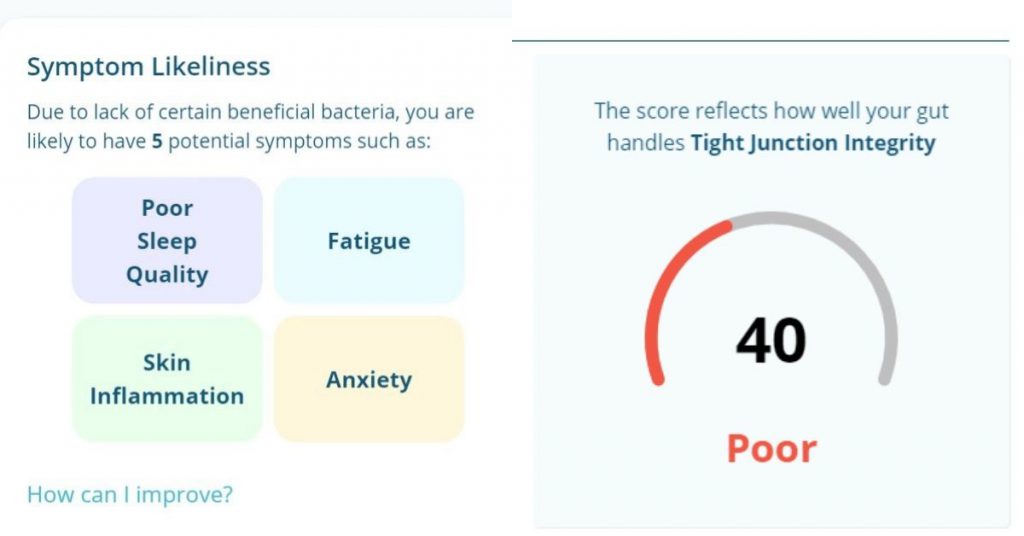I like to pride myself on my fast metabolism, but I’ve also noticed that I tend to have gut issues more easily than most. There was a time when it got pretty bad that I even decided to buy prebiotic pills to see if they’d help.
DNA health kits aren’t new to me, but when Thryve reached out, it was the first I’d heard of a gut health test kit specifically.
Always curious about what goes on inside of us, my boss, Sarah and I said yes to testing it enthusiastically, so here’s our experience.
Sending Our Poop Samples Off
- Use the two long cotton swabs in the “Collect” box to gather your poop sample as per instructions.
- You can return your sample using the “Send” box, or seal it in a provided bubble wrapped envelope.
- Make an account on Thryve’s website, and register your kit ID there. This lets you track the progress of your sample processing and gives you access to your results.
- Thryve pulls data from its index of over 36,000 microbiome research articles to provide descriptions of 3,000+ kinds of bacteria. This enables them to tell you what microbes you have or lack, and why each one matters.
Getting Our Gut Report Cards
Thryve has 2 different plans: Essential and Premium, the latter of which will provide you with more detailed reports for an additional one-time cost of US$49.99 (RM203.08), but more on that later.
On Essential, we could see our Gut Score, mine of which was a sad 55 and bordering on yellow. Sarah, on the other hand, proudly announced her green 83 score.
This report summarised our gut wellness and our gut microbiome diversity, based on the richness (variety of bacterial species), and evenness (amount of an individual species) of it.
There’s a microbiome report to tell me if my good and bad bacteria were in healthy ranges. As these are just a lot of names and data, it’s complemented by the Symptom Likeliness report that summarises 5 main symptoms I may suffer from as a result of my gut bacteria.
For my case, my 5 highlighted symptoms were anxiety, fatigue, poor sleep, itchy and dry skin, and trouble with maintaining a healthy weight, all because I lacked specific bacteria.

However, some of Sarah’s symptoms like abdominal pain, bloating, fatigue and trouble with weight were due to a surplus of good bacteria, which had us wondering why.
When we reached out to Thryve for clarification, Clinical Research Partner Kimberly told us, “Too much or too little growth of bacteria can produce symptoms generally associated with a dysbiotic state.”
Dictionary Time: Dysbiosis is often defined as an “imbalance” in the gut microbial community that is associated with disease.
ScienceDirect
“Even beneficial bacteria can overgrow and have shown within the research to induce associated symptoms.” The solution would be to selectively feed the beneficial bacteria with prebiotic foods and probiotics to balance them out.
At the Food Recommendations section, there’s a list of what to add and avoid in your diet. If you can’t tolerate some recommendations based on experience or preference, Kimberly suggested incorporating tiny amounts of the recommended food to train your sensitivities if possible.

How These Little Guys Affect Us
In Premium, you’d find comparisons of your gut health to the global average and how your bacteria affect the efficiency of your gut, and its impact on your health in different aspects.
For the first section, Compare, Sarah and I found that it certainly provided a lot more data, but wondered why these comparisons against the average mattered.
Kimberly shared that it could be considered for general curiosity, but being that it covers such large data sets, it’s helpful to see where the averages fall out. “If there is a high ratio, this could indicate an overgrowth and/or strong deficiency.”
The second section, Repair further broke down the scores of our gut performance. What was interesting to note was that while I had poor gut wellness, I scored much better than Sarah in a lot of these categories.
For example, my responses to inflammation and food intolerance skewed more to a green score of 70-80. On the other hand, Sarah’s impressive gut wellness score didn’t translate into good results for her here.
We took our confusion to Kimberly again, who said, “The scoring with the Repair section is based on specific species of bacteria that have been shown to affect that specific category.”
She took the Inflammation category with butyrate as an example. Butyrate is a short-chain fatty acid, so the score is based on whether you have enough of these bacteria to produce it.
So you can be like me with lower levels of non-butyrate producers and a lower overall wellness score (my 55), but still beat someone with higher levels of non-butyrate producers and a higher overall wellness score (like Sarah) in this specific category.
Another thing was how our results didn’t seem to match our personal experiences, particularly with our ability to process certain items like gluten, for example.
Sarah got a good result on her gluten-processing, but she’s always dealt with bad bloating and other symptoms even after small amounts of gluten.
According to Kimberly, items like gluten and lactose have specific bacteria to break them down, so if you have high levels of these bacteria, you’ll get a high score.
However, there are other factors that influence the breakdown or inflammatory response for the items. “If someone is lacking the lactase enzyme, they will still have symptoms associated with lactose even though they have good bacteria levels,” she said.
“With gluten, there could be an inflammatory reaction such as gluten sensitivity that is based on how the body sees gluten. If the immune system sees it as an invader, it doesn’t matter how much the bacteria break it down.”
If you see a score of 0 in the Vitamin Production category, don’t freak out (we certainly did for a while).

This simply means that the bacteria associated with producing that vitamin is deficient, but in most cases, you can get that vitamin from your daily meals. Otherwise, there are supplements that you can take.
Personalised Probiotics For Your Gut
Speaking of supplements, Thryve offers its own 30-day supply (60 capsules) of personalised probiotic blend based on what concern you pick in a survey.

In each blend, there will be specific strains of bacteria along with descriptions of how they benefit your body.
You aren’t tied to purchasing Thryve’s blend, so with your own research you could always opt to buy your probiotics elsewhere. The downside is that you could end up buying a product that doesn’t match 100% all the bacteria strains that you require, and therefore your symptoms may not change.
Thryve’s personalised blend has a monthly subscription that’s US$34.99 (RM142.43), or you can opt for a 3-month bundle for US$89.99 (RM366.30). This is in addition to the kit’s cost of US$99 (RM402.98).
Sarah and I have not tried Thryve’s probiotics so we cannot speak for it, but overall, we found the gut health kit to be informative and revealed a lot of useful explanations for some of our physical conditions.
We actually tried to follow some of their food recommendations for 2 weeks. Sarah felt that her bloating was less frequent, but it wasn’t that huge a change. Perhaps the only way to really make a difference is to treat the root cause and fully balance out the bacteria ecosystem.
Featured Image Credit: Vulcan Post / Thryve




















